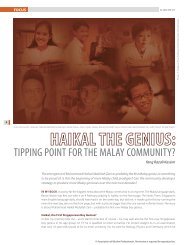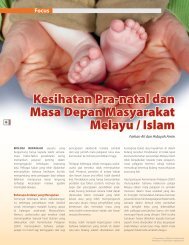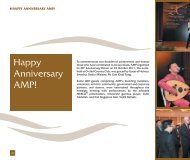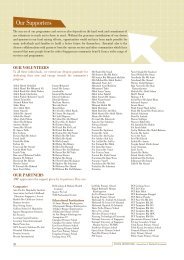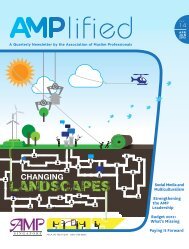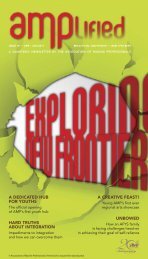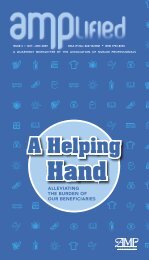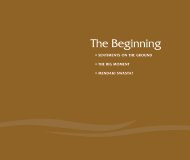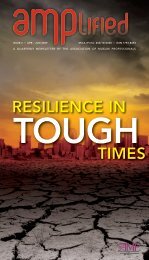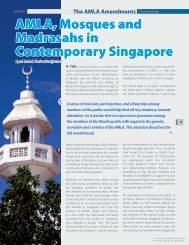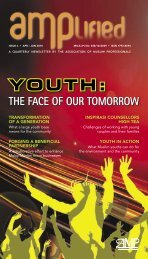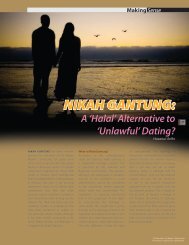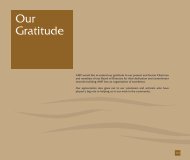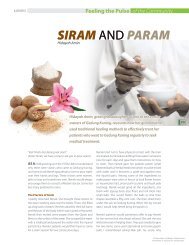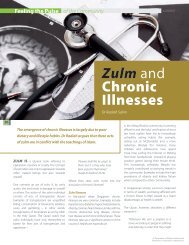The AMLA Amendments - Association of Muslim Professionals
The AMLA Amendments - Association of Muslim Professionals
The AMLA Amendments - Association of Muslim Professionals
Create successful ePaper yourself
Turn your PDF publications into a flip-book with our unique Google optimized e-Paper software.
KARYAWAN<br />
Focus<br />
<strong>Muslim</strong> Community <strong>of</strong> Excellence in 2005. <strong>The</strong>se attributes<br />
articulate the universal values <strong>of</strong> Islam in modern living,<br />
promote a progressive and inclusive outlook <strong>of</strong> Islam and set<br />
the foundations for a uniquely Singapore <strong>Muslim</strong> identity.<br />
<strong>The</strong> SMI project exemplifies the drive towards formulating<br />
a uniquely Singapore model <strong>of</strong> excellence in socio-religious<br />
life in which a minority <strong>Muslim</strong> community thrives in a<br />
secular society.<br />
<strong>The</strong> SMI initiative was also a case <strong>of</strong> seizing the opportunity<br />
and setting the agenda <strong>of</strong> moderation and integration firmly<br />
amidst the adverse perceptions <strong>of</strong> Islam and <strong>Muslim</strong>s triggered<br />
by regional and global events such as 9/11 and the Jemaah<br />
Islamiyah (JI) threat, as well as the ensuing Islamophobia.<br />
Philosophically, it could also be viewed as Singaporean<br />
<strong>Muslim</strong>s’ answer to the call for the silent majority to assert<br />
itself and not allow parochial and exclusivist views to dominate<br />
the space and overshadow mainstream moderate values.<br />
SMI attempts to demonstrate that Islam is<br />
not at odds with democracy and modernity<br />
and <strong>Muslim</strong>s can live comfortably in a secular<br />
society. However, it needs to find its place<br />
on the world stage to be an effective and<br />
influential voice to mobilise opinions and<br />
shape the right perceptions <strong>of</strong> the religion.<br />
From another perspective, SMI is seen as an important part<br />
<strong>of</strong> the nation-building exercise and rightly so, given the<br />
prevailing negative perceptions <strong>of</strong> Islam then (and now).<br />
<strong>The</strong>re is a need to involve non-<strong>Muslim</strong>s to understand what<br />
Islam stands for and appreciate the aspirations <strong>of</strong> their<br />
fellow <strong>Muslim</strong> citizens. Of course, there are skeptics in the<br />
community who read this with caution and speculate that<br />
the SMI is packaged with touches <strong>of</strong> the “establishment”<br />
views and preferences or that it was a self-correcting effort<br />
to align the community with mainstream secular thinking in<br />
the larger society.<br />
Issues <strong>of</strong> Integration<br />
<strong>The</strong> theological position <strong>of</strong> <strong>Muslim</strong> minorities living in socalled<br />
non-<strong>Muslim</strong> ruled countries is a well-researched<br />
area. Tariq Ramadan, in his well-known book “To Be a<br />
European <strong>Muslim</strong>”, argues that once the ability to fulfill<br />
one’s religious obligations is met and religious freedom<br />
assured, <strong>Muslim</strong>s are required to observe the constitution<br />
‘While it is difficult to disagree with the ten attributes for<br />
example, there are some who take issue with the “prescriptive”<br />
approach adopted in articulating them and the suggestion,<br />
however implicit, <strong>of</strong> the need to conform. ‘<br />
3<br />
Within the community, the SMI is a platform to create<br />
awareness <strong>of</strong> the need to remain relevant and for <strong>Muslim</strong>s to<br />
be active participants in Singapore’s progress. Although the<br />
community’s religious landscape is less diverse than other<br />
<strong>Muslim</strong> societies, it remains a tall order to expect the various<br />
constituents <strong>of</strong> our community like the asatizahs, civil society<br />
activists and the average <strong>Muslim</strong> men or women to identify<br />
fully and accept the SMI in its entirety.<br />
While it is difficult to disagree with the ten attributes<br />
for example, there are some who take issue with the<br />
“prescriptive” approach adopted in articulating them and the<br />
suggestion, however implicit, <strong>of</strong> the need to conform. <strong>The</strong>re<br />
are those who perceive the attributes as “instructive” and the<br />
SMI an exercise to align key stakeholders to one set <strong>of</strong> ethos<br />
articulated by an over-arching institution. On reflection,<br />
perhaps a “s<strong>of</strong>ter” approach would have secured better<br />
acceptance – one that recognises and is seen to recognise<br />
the various orientations and views in the community and<br />
adopt a more consensual approach. <strong>The</strong> focus should also be<br />
on values rather than a cardinal set <strong>of</strong> attributes that <strong>Muslim</strong>s<br />
are encouraged to comply.<br />
and the rule <strong>of</strong> law <strong>of</strong> their country <strong>of</strong> residence and<br />
fulfill their “contractual” obligations as a citizen. He drew<br />
inspiration from the Sira <strong>of</strong> the Prophet, specifically the<br />
Prophet’s commitment to covenants or contracts with<br />
non-<strong>Muslim</strong>s and his establishment <strong>of</strong> the Charter <strong>of</strong><br />
Medina that was constituted to administer a multireligious<br />
society in Medina shortly after the Hijrah.<br />
Tariq Ramadan postulates that a <strong>Muslim</strong>’s association<br />
with the ummah is fulfilled through active and positive<br />
involvement in society based on the principles <strong>of</strong> justice and<br />
equality. What this means is that while a <strong>Muslim</strong> is related to<br />
other <strong>Muslim</strong>s in other parts <strong>of</strong> the world through religious<br />
affiliation and a sense <strong>of</strong> brotherhood, he or she must observe<br />
the rule <strong>of</strong> the law and be guided by the principle <strong>of</strong> justice<br />
in acting on such associations. This applies to situations<br />
such as supporting a cause or protest against a perceived<br />
mistreatment <strong>of</strong> <strong>Muslim</strong>s in another country. Furthermore,<br />
he argues that <strong>Muslim</strong>s should be comfortable with living in<br />
a secular and democratic society as values upheld in these<br />
societies such as law and citizenship that are not based on<br />
religion are not in antithesis to Islam. <strong>The</strong> values <strong>of</strong> equal<br />
© <strong>Association</strong> <strong>of</strong> <strong>Muslim</strong> Pr<strong>of</strong>essionals<br />
Permission is required for reproduction.



